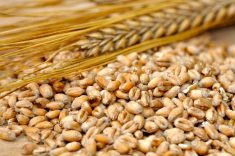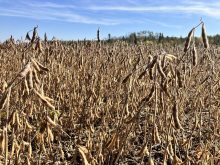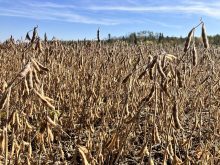Given recent federal moves to regulate Canada’s major railways into moving more grain, Claude Mongeau came to Winnipeg Wednesday feeling “a little bit like a general who lost the battle.”
Speaking to the Winnipeg Chamber of Commerce, the CEO of Canadian National Railway (CN) said he was in town to make the case that “regulation is not the right solution. That it could set us backward.” [Related story]
Regulations have more to do with punishing railroads than moving grain, Mongeau said. And when it comes to interswitching, “I don’t know how I could move (Canadian Pacific Railway’s) grain when I’m being told that I don’t move the grain that I have,” he said.
Read Also

Wheat breeding system no longer works, Canadian Wheat Research Coalition report says
A Canadian Wheat Research Coalition report, published Feb. 26, says the status quo is not an option for Canada’s wheat breeding system. It must be transformed, by farmers.
“So if interswitching was designed to help more surge capacity, I need to go back to high school,” Mongeau added.
In interswitching, one rail carrier picks up cars from a shipper and delivers them to another railway for the line haul. The federal government said last month it will authorize the CTA to extend maximum interswitching distances in Saskatchewan, Alberta and Manitoba to 160 km, up from 30 currently.
Interswitching would allow BNSF, for example, to poach north of the border when the U.S. railway has extra cars, Mongeau said. “This is bad, bad policy made in the heat of the moment to punish the railroads for not moving a 100-year crop in a difficult winter.”
Mongeau said Wednesday he hoped Ottawa would limit interswitching to grain in the Prairies to see if it made sense to “open up the railroads to unfair competition in the heat of the moment.” (Federal officials in March said the proposed interswitching expansion would apply to all commodities handled on the Prairies.)
CN believes in collaboration, not finger-pointing, Mongeau said. “But when we are taken to the mat and being regulated the way we are, we’ve just got to do what we got to do.”
He added that if the government was going to regulate the railways, “we should co-ordinate and regulate all the players” so everyone works in the interest of farmers and maximizes grain movement.
Wade Sobkowich, executive director of the Western Grain Elevator Association, said in an interview following Mongeau’s presentation that the railways already have the right to set and levy penalties against shippers for performance.
“If we don’t load the rail cars within a specified time period, we pay a penalty to the railway,” said Sobkowich. “And if we don’t unload the rail car within a specified time period, we pay a penalty to the railway.” [Related story]
“All the emotions”
Mongeau took aim directly at Sobkowich’s “hard advocacy” during the Chamber of Commerce event.
He said grain elevators have been “trying to shift the blame away from their own participation in the supply chain, to concentrate the focus and all the emotions on railroads, and railroads alone.”
“We’ve been trying to make it known that we have an unbalanced commercial relationship with the railways,” Sobkowich responded. “We’ve been talking about this for years and years.”
Sobkowich said he runs a one-person shop and only visits Ottawa about four times a year. CN has “tons of resources, and they lobby daily in Ottawa,” he added.
Mongeau said the grain elevators weren’t moving crop in the first five weeks of the harvest year, which began in August, “while the crop was maturing in their own backyards.”
Mongeau acknowledged canola carryout was very low. “But there was durum. There was wheat. And if we’re going to blame railroads for not operating in the winter, it’s only fair to ask ourselves a question: Should grain elevators start shipping earlier to make room for storage so that we get a head start?”
Sobkowich says last year’s carryout was minimal. “And then we had a later-than-normal harvest and the crop wasn’t available to producers for the first five or so shipping weeks of the crop year.”
“Because the farmers are typically in the field harvesting they’re not focused on delivering to the elevators until the harvest is well in-hand,” he added.
Mongeau said no one expected 2013’s record-breaking yields. Once it was clear how big the 2013 bin-buster was, CN picked up the pace, Mongeau said.
“We took our spotting level above the best performance in our history,” he said. CN moved an average of over 5,000 hoppers per week until early December, he told listeners.
Sobkowich said the railways told grain companies to expect about 10,000 or 11,000 cars per week last fall. “And the railways didn’t consistently hit those numbers. They planned for those numbers but they never actually delivered on those numbers.”
Cold weather slowed operations over the winter, but CN geared up again when the cold eased, Mongeau said. CN’s improved spring performance had nothing to do with the order-in-council, he said.
“When the weather broke, we snapped right up,” said Mongeau.
“Aching”
A recent update from Quorum Corp., the agency monitoring grain movement on Ottawa’s behalf, states the number of cars unloaded in Vancouver is 23 per cent lower than the cars allocated by both railways this crop year. Prince Rupert saw eight per cent fewer cars than allocated.
The Quorum report states the number of cars allocated by railways and the number unloaded at port is “a critical issue.”
While the Prince Rupert terminal is “doing a wonderful job,” not all the West Coast terminals are keeping up, Mongeau said.
“In Vancouver this weekend, two of the five grain elevator companies were not receiving our traffic. They were too full. And we had cars staged, waiting to be unloaded,” he said.
Mongeau said between CN and CP, 6,200 cars were going to the West Coast, but the entire system is at capacity. The additional 5,000 cars needed to meet the government’s order-in-council need to go somewhere else, he said.
“We’re aching for Thunder Bay to open,” he said.
— Lisa Guenther is a field editor for Grainews at Livelong, Sask.
















